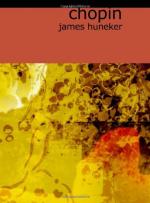Think of the men and women with whom the new comer associated— for his genius was quickly divined: Hugo, Lamartine, Pere Lamenais,—ah! what balm for those troubled days was in his “Paroles d’un Croyant,”—Chateaubriand, Saint-Simon, Merimee, Gautier, Liszt, Victor Cousin, Baudelaire, Ary Scheffer, Berlioz, Heine,—who asked the Pole news of his muse the “laughing nymph,"- -"If she still continued to drape her silvery veil around the flowing locks of her green hair, with a coquetry so enticing; if the old sea god with the long white beard still pursued this mischievous maid with his ridiculous love?”—De Musset, De Vigny, Rossini, Meyerbeer, Auber, Sainte-Beuve, Adolphe Nourrit, Ferdinand Hiller, Balzac, Dumas, Heller, Delacroix,—the Hugo of painters,—Michelet, Guizot, Thiers, Niemcevicz and Mickiewicz the Polish bards, and George Sand: the quintessence of the Paris of art and literature.
The most eloquent page in Liszt’s “Chopin” is the narrative of an evening in the Chaussee d’Antin, for it demonstrates the Hungarian’s literary gifts and feeling for the right phrase. This description of Chopin’s apartment “invaded by surprise” has a hypnotizing effect on me. The very furnishings of the chamber seem vocal under Liszt’s fanciful pen. In more doubtful taste is his statement that “the glace which covers the grace of the elite, as it does the fruit of their desserts,...could not have been satisfactory to Chopin”! Liszt, despite his tendency to idealize Chopin after his death, is our most trustworthy witness at this period. Chopin was an ideal to Liszt though he has not left us a record of his defects. The Pole was ombrageux and easily offended; he disliked democracies, in fact mankind in the bulk stunned him. This is one reason, combined with a frail physique, of his inability to conquer the larger public. Thalberg could do it; his aristocratic tournure, imperturbability, beautiful touch and polished mechanism won the suffrage of his audiences. Liszt never stooped to cajole. He came, he played, he overwhelmed. Chopin knew all this, knew his weaknesses, and fought to overcome them but failed. Another crumpled roseleaf for this man of excessive sensibility.
Since told of Liszt and first related by him, is the anecdote of Chopin refusing to play, on being incautiously pressed, after dinner, giving as a reason “Ah, sir, I have eaten so little!” Even though his host was gauche it cannot be denied that the retort was rude.
Chopin met Osborne, Mendelssohn—who rather patronized him with his “Chopinetto,”—Baillot the violinist and Franchomme the ’cellist. With the latter he contracted a lasting friendship, often playing duos with him and dedicating to him his G minor ’cello Sonata. He called on Kalkbrenner, then the first pianist of his day, who was puzzled by the prodigious novelty of the young Pole’s playing. Having heard Herz and Hiller, Chopin did not fear to perform his E minor concerto for him.




